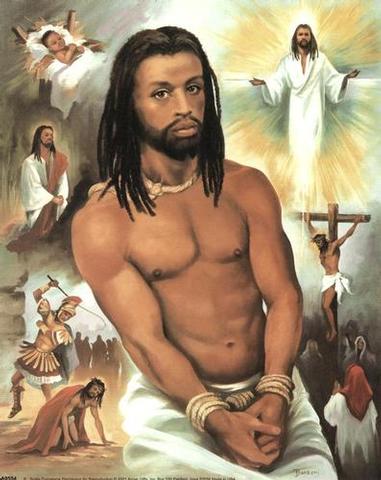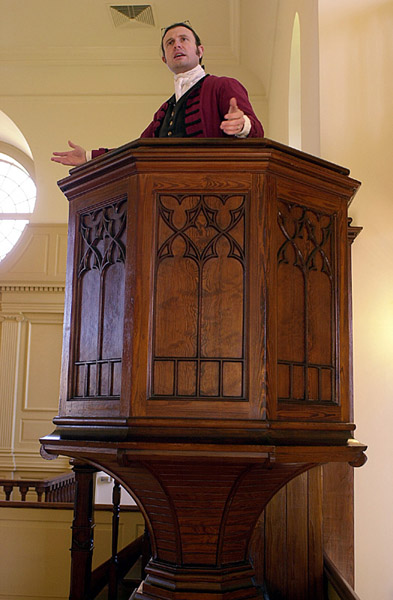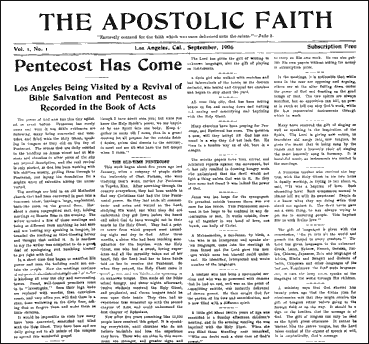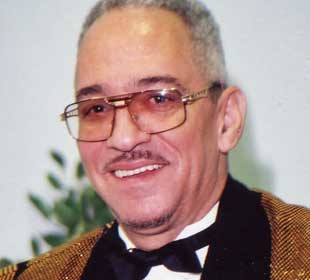 With the eyes of Black Liberation Theology professors uncomfortably squinting from their rude exposure to the national news spotlight, many of us find ourselves rummaging through the tenets of this relatively little known faith, trying to understand what it is all about. Rarely, since the Inquisitions of the Middle Ages, except maybe the twisted Christianity of white supremacist groups, has hatred and vengeance been so evident in a religious movement. This theology calls for serious examination, especially if it has been embraced to any degree by the Illinois Senator, Barack Obama, who, at this writing, has convincing odds to be the next president of the United States. It should go without saying that the religion of the occupant of the highest office in the world enjoys a preferred position in attracting new adherents.
With the eyes of Black Liberation Theology professors uncomfortably squinting from their rude exposure to the national news spotlight, many of us find ourselves rummaging through the tenets of this relatively little known faith, trying to understand what it is all about. Rarely, since the Inquisitions of the Middle Ages, except maybe the twisted Christianity of white supremacist groups, has hatred and vengeance been so evident in a religious movement. This theology calls for serious examination, especially if it has been embraced to any degree by the Illinois Senator, Barack Obama, who, at this writing, has convincing odds to be the next president of the United States. It should go without saying that the religion of the occupant of the highest office in the world enjoys a preferred position in attracting new adherents.
Terms and phrases like “blackness”, “critical reflection on the historical praxis”, “lay practitioners” and other strange word combinations employed by Liberation theologians formulate a religion substantially different from orthodox theology. And it’s not just unfamiliar doctrine. The very deity enthroned by Liberation Theology bears little resemblance to the conventional Jehovah-Jesus as understood by most Christians. One example is that BLT theologians openly claim that Jesus was a black man. The insidious nature of this theology, however, is its use of many of the same terms familiar with most Christians, like the cross, righteousness, justification, etc., but with hybrid meanings, code phrases and essential reversals. Black Liberation Theology evolves from several sources, including the historical and religious experience of African American people, the alleged revelation of God at work in the black experience, the interpretation of Scripture, the truth as ascribed to Jesus Christ, and selected church traditions.
Questions abound. Is the Jesus of Black Liberation Theology the true Jesus, or have they distorted him and his message and reformulated him into a perverse caricature of the Jesus of the Bible? Why does hatred comprise the premise of their belief system? Did we miss something in our childhood Sunday school classes? Should those of us in the “oppressors’” community have sung, “Yes, Jesus hates me?” Does Jesus hate more than he loves, or does he demonstrate his love by his hatred? Are there traces of truth in the Liberation Theology Jesus but without delimiters? As we examine this theology, I believe we will see that Black Liberation Theology (BLT) has exploited the Jesus of the Bible, that it has recast historical truth into heresy, that it has imposed a belief system built from bitter, hate-mongering attitudes and that it has subverted Christ’s over-arching message of love and forgiveness. Moreover, the ultimate solution of BLT to black angst consists of violence, vengeance and death, concepts that are antithetical to the broad themes of the Bible. To BLT adherents, all of these objections raised in this article are expected white equivocations to their theology. Nevertheless, they need to be articulated to establish parameters for the necessary dialogue.
Angry ripostes of the “privileged class” will not suffice here. For those of us who reject BLT to call for equality of the races, to insist on the “color-blindness of God”, to affirm a belief in individual responsibility and self-determination and to believe that God wants us to love everybody—all of the usual arguments against racism and bigotry—are positions basically laughed off by Black Liberation theologians. They say that such arguments show a profound lack of understanding of the real plight of the oppressed and that the burden of history cannot be explained away so sweetly and innocently. This is why talk show hosts who ask simplistic questions of BLT proponents never get straight answers. The questions are considered to be stupid, based in ignorance and BLT professors will not play along. In order to make our case against BLT, we must go beyond the superficial and look at the very premises of this system. When we do, we will discover that those who subscribe to BLT continue to do so for reasons other than sound Biblical exegesis.
Origins and Core Beliefs of Black Liberation Theology
Although Dr. Jeremiah Wright has become the most famous representative of Liberation Theology due to his widely publicized sermon excerpts, Dr. James Cone is actually considered to be the standard bearer for the movement. A passionate, expressive and persuasive speaker, Cone exudes a zealot’s confidence in his theology. There is almost no aspect of the Christian religion that he cannot and does not relate to his perspective of blackness. He has articulated Liberation views in his books, Black Theology and Black Power, A Black Theology of Liberation, God of the Oppressed and Risks of Faith: The Emergence of a Black Theology of Liberation. We get some of the flavor of his theology in these quotes:
“As we examine what contemporary theologians are saying, we find that they are silent about the enslaved condition of black people. Evidently they see no relationship between black slavery and the Christian gospel. Consequently there has been no sharp confrontation of the gospel with white racism. There is, then, a desperate need for a black theology, a theology whose sole purpose is to apply the freeing power of the gospel to black people under white oppression.” Black Power and Black Theology.
“The black theologian must reject any conception of God which stifles black self-determination by picturing God as a God of all peoples. Either God is identified with the oppressed to the point that their experience becomes God’s experience, or God is a God of racism…The blackness of God means that God has made the oppressed condition God’s own condition. This is the essence of the Biblical revelation. By electing Israelite slaves as the people of God and by becoming the Oppressed One in Jesus Christ, the human race is made to understand that God is known where human beings experience humiliation and suffering…Liberation is not an afterthought, but the very essence of divine activity. ( A Black Theology of Liberation , pp. 63-64)
These excerpts from Cone’s books purport to elevate Liberation theology to a scripturally defensible and historically justifiable position. Further study, however, reveals the heavy influence of Afro-centrism, Marxism and Christian socialism as initiated by the Catholic Church in Latin America pre-1980. Specifically, Cone combines the tenets of the Black Power movement led by Malcolm X with the Christianity of Dr. Martin Luther King, Jr. in crafting his Black Liberation Theology. BLT professors do not hold these positions as mere intellectual preferences or theories. They want radical, sweeping, effective change. They openly support varying degrees of social unrest, social disorder and guerilla warfare—in short, any strategy that overthrows the current power establishment and flips the control from the oppressors to the oppressed. Such blatant advocacy of aggression to advance their agenda forces their theology out of the seminary and into the streets. What appears to the uninformed to be interesting differences in theology actually becomes fodder for raw emotion, hatred and class warfare. The following quotes, attributed to James Cone, aptly illustrate this point:
“Black theology refuses to accept a God who is not identified totally with the goals of the black community. If God is not for us and against white people, then he is a murderer, and we had better kill him. The task of black theology is to kill Gods who do not belong to the black community … Black theology will accept only the love of God which participates in the destruction of the white enemy. What we need is the divine love as expressed in Black Power, which is the power of black people to destroy their oppressors here and now by any means at their disposal. Unless God is participating in this holy activity, we must reject his love.”
“In the New Testament, Jesus is not for all, but for the oppressed, the poor and unwanted of society, and against oppressors. Either God is for black people in their fight for liberation and against the white oppressors, or he is not.” [Cone].
Indeed, Liberation theologians filter the entire message of the Bible and God through the lens of liberation. In so doing, they filter out any other perspective. Accordingly, they brand as illegitimate any interpretation of God that does not identify him as primarily an advocate or savior of the oppressed. Whatever havoc this wreaks upon the white establishment, whatever carnage it leaves in its wake, what ever suffering it causes for their enemies, is, in their view, still an inadequate payback for the centuries of injustice and cruelty sustained by black or oppressed races from their tormentors. Rather than the theology of liberation, it may more aptly be called the theology of grievance, for this is what constitutes the sum and substance of the belief system. Aggrieved and oppressed people must no longer accommodate “white” supremacy, whether it be in politics, economics or religion. Justice calls for the long, torturous history of oppression to be over and reparations made.
What prompted the birth of Black Liberation Theology? Why do we need a “black Jesus”, to use the terminology of James Cone? Why must a subjective theology for blacks exist instead of an objective theology for people of all races? Black Liberationists respond that they cannot identify with a God who has been shaped in the image of white Europeans. Anthony B. Bradley, an assistant professor of theology at Covenant Theological Seminary offers this explanation:
“For Black theologians White Americans do not have the ability to recognize the humanity in persons of color, Blacks need their own theology to affirm their identity in terms of a reality that is anti-Black—Blackness stands for all victims of White oppression. “White theology,” when formed in isolation from the Black experience, becomes a theology of White oppressors, serving as divine sanction from criminal acts committed against Blacks. Cone argues that even those White theologians who try to connect theology to Black suffering rarely utter a word that is relevant to the Black experience in America. White theology is not Christian theology at all. There is but one guiding principle of Black theology: an unqualified commitment to the Black community as that community seeks to define its existence in the light of God’s liberating work in the world.” (www.FreeRepublic.com, 3-26-2008.)
In light of this, one must wonder whether we need an oriental theology to relate to the Asian experience; or a Native American theology, or a South Pacific theology, or an Eskimo theology, or an Amazon basin theology, etc., This is not mockery, but taking the argument out to its logical conclusion. Since each of these groups or ethnicities process the world through their own unique praxis or experience, then, according to the premise of Black Liberation Theology, they need to create a belief system best suited to them. Actually, this has already happened thousands of years ago. It’s called paganism and it is predicated upon the belief in many gods and many religions. If the monotheistic theology of the Bible is flawed though imperfect human interpretation, the best course would seem to be to fix the interpretation instead of developing a parallel theology for any particular group of people.
Heresy of Black Liberation Theology
When we examine some of the particulars of Black Liberation Theology we discover why they must be rejected by those of us who believe the Bible. Keep in mind that, as a subject, racism and social injustice has inspired a huge body of work that cannot be addressed in this short piece, therefore much of the controversy lies outside the scope of this article. The following points do address the points I consider to be the most salient to Bible believers of the Apostolic faith.
The Jesus of Black Liberation Theology does not exist. BLT reconfigures Jesus into a universal symbol of the oppressed. It interprets the incarnation as the first step in God identifying with the aggrieved masses; it defines the focus of his ministry as consistently centered upon the underdog; it holds that his constant conflict with the Jewish hierarchy reveals Jesus as the perpetual symbolic victim of governmental power; and it views his execution upon the cross as the ancient counterpart to the lynching tree faced by exploited blacks in America. Their extreme makeover of Jesus transforms him from a magnanimous figure of love and forgiveness into an angry, embittered vigilante who is out to even the score. From the position of the aggrieved, this makes a world of sense. They have created a Jesus with a composite persona of Robin Hood, Mahatma Gandhi, Fidel Castro and César Chávez, with a lot of Karl Marx thrown in. Driven by a largely carnal, humanistic vindictiveness, they lash out against any symbol of oppression, whether it be white skin, financial wealth or centers of governmental power. This is why the Liberation Theology believers, especially in Latin America, were sympathizers with and supporters of communistic takeovers. Communism is the political counterpart to the more religious Black Liberation Theology. BLT sanctifies violence, justifies rebellion and blesses raw hatred. Because they will not remove their eyeglasses of grievance, they cannot see any other purpose, any other mission, or any other victory for Christ than his representation of the oppressed.
The social gospel of BLT strips the supernatural and eternal truths away from Jesus and makes him just another player in a long line of freedom fighters. The Jesus of the Bible was neither a flaming vigilante nor an advocate of violence. He did withstand all attacks against the disadvantaged, but he preached an inviolate message of love, forgiveness and submission. He was the Son of God come to earth to prove the ascendancy of the Spirit over the rule of the flesh. His divine attributes brought healing to the diseased; his compassion lifted up the hurting; his intrinsic power as God incarnate rolled the stone away from his tomb and he walked out a living witness to his power over death. His death on the cross was not just a symbol for the suffering of the oppressed. It was a sinless sacrifice offered as the atonement for all of our sins. The resurrection was not a motivational act for those who fight for social justice. It was the gift of tangible hope that believers can live again. Jesus came to show that, regardless of the human condition, through him we can all be overcomers.
Black Liberation Theology has subverted Christ’s over-arching message of love and forgiveness. No one disputes the fact that Jesus was a friend of the poor. Black Liberationists, however, place such disproportionate emphasis on this role of Christ that they make it the sole purpose for the ministry of Jesus. Dwight Hopkins, a professor at the University of Chicago Divinity School points to Luke 4 as the guide for Christian purpose and mission.
“And when he had opened the book, he found the place where it was written, 18 The Spirit of the Lord is upon me, because he hath anointed me to preach the gospel to the poor; he hath sent me to heal the brokenhearted, to preach deliverance to the captives, and recovering of sight to the blind, to set at liberty them that are bruised, 19 To preach the acceptable year of the Lord.” Luke 4:17-19.
“Jesus says my mission is to eradicate poverty and to bring about freedom and liberation for the oppressed,” Hopkins says. “And most Christian pastors in America skip over that part of the book.” (Ben Calhoun, NPR, 3-18-2008). But, did Jesus intend for the church to focus on the poor, the brokenhearted and the captive to the exclusion and outright denial of the very essence and spirit of Christianity? Black Liberation Theology takes the methodology of Christ out of the realm of spirituality and makes it into a political and social movement. From Luke 4:18, they make a non-sequitur leap to condemning all persons of means, hating all heartbreakers and cursing all captors. If we are to love one class of people, they believe we have to hate another class. Thus, in their efforts to tip the balance of power, they have overreached and have fallen in the ditch on the other side of the road. BLT adherents also skip over parts of the book.
27 But I say unto you which hear, Love your enemies, do good to them which hate you, 28 Bless them that curse you, and pray for them which despitefully use you. 29 And unto him that smiteth thee on the one cheek offer also the other; and him that taketh away thy cloke forbid not to take thy coat also. 30 Give to every man that asketh of thee; and of him that taketh away thy goods ask them not again. 31 And as ye would that men should do to you, do ye also to them likewise. 32 For if ye love them which love you, what thank have ye? for sinners also love those that love them. 33 And if ye do good to them which do good to you, what thank have ye? for sinners also do even the same. 34 And if ye lend to them of whom ye hope to receive, what thank have ye? for sinners also lend to sinners, to receive as much again. 35 But love ye your enemies, and do good, and lend, hoping for nothing again; and your reward shall be great, and ye shall be the children of the Highest: for he is kind unto the unthankful and to the evil. 36 Be ye therefore merciful, as your Father also is merciful. Luke 6:27-36.
Black Liberation Theology has recast historical truth into heresy. One of the most egregious facets of Black Liberation Theology is not necessarily what it is for, but what it is against. It affirms the poor and oppressed, it espouses the plight of the disadvantaged and it provides a positive identity to those who have been deprived in life. No fair-minded person would deny that these are righteous causes. At the same time, however, BLT savages anything and everything that represents power and the establishment. Cone writes,
“Jesus had little toleration for the middle or upper-class religious snob whose attitude attempted to usurp the sovereignty of God and destroy the dignity of the poor… The Kingdom is not for the poor and not the rich because the former has nothing to expect from the world while the latter’s entire existence is grounded in his commitment to worldly things. The poor man may expect everything from God, while the rich man may expect nothing because he refuses to free himself from his own pride. It is not that poverty is a pre-condition for entrance into the Kingdom. But those who recognize their utter dependence on God, and wait on him despite the miserable absurdity of life are typically the poor, according to Jesus.” (www.wfu.edu.)
BLT sells its soul to the idea of divine bias. God is a respecter of persons, despite well rehearsed scriptures to the contrary. No one who has accumulated wealth or has consolidated a power base enjoys the favor of God. If this view were true, Jesus should have reacted very differently to Nicodemus, an aristocratic Jew who sought out the Master under cover of darkness. Instead of engaging him in spiritual concepts like the new birth, Jesus should have castigated him for his elitism and power-mongering. But, Jesus made a point to talk to Nicodemus about heavenly things, not earthly. In addition, we must not miss the point that eternal salvation is intrinsically tied to belief in Jesus, not to social justice.
“ That whosoever believeth in him should not perish, but have eternal life. 16 For God so loved the world, that he gave his only begotten Son, that whosoever believeth in him should not perish, but have everlasting life. 17 For God sent not his Son into the world to condemn the world; but that the world through him might be saved. 18 He that believeth on him is not condemned: but he that believeth not is condemned already, because he hath not believed in the name of the only begotten Son of God. John 3:15-18.
BLT unashamedly traces its roots to the here-and-now of African tradition as opposed to the Christian teaching of the afterlife. BLT disparages the idea of rugged individualism, although the scriptures plainly teach that anyone who does not work should not eat, that each of us should bear our own burden and that we will be judged by the works done in the flesh. BLT practitioners openly denounce the rich and the white, fomenting and encouraging hatred against them, despite Christ’s command to love our neighbor as ourselves. Although they sometimes deny it, BLT advocates violence against the white establishment. When violence does occur against government or white institutions, they passively shrug their shoulders and comment that it was deserved. They adopt this position that runs counter to Paul’s teaching that we are to honor the powers that be.
Black Liberation Theology has imposed a bitter, hate-mongering approach upon the essence of Christianity. Although much has been said about BLT and hatred, let’s examine it one layer deeper. It seems inconceivable that the “critical praxis” claimed by the black race could so pervert the noble ideals of Christianity as to turn it into a rabid, malignant Black Liberation Theology. This assessment does not invalidate the inherent reasons for the hatred of blacks for whites. It is indisputable that inhumanity and injustice has been reticulated into the black experience over the centuries, beginning with slavery and then progressing into segregation, discrimination and violence. Yet, no individual, group, race or nation has ever been positively affected by such wholesale embracing of institutional hatred. From a purely scriptural standpoint, hatred is to be resisted as a work of the flesh, not embraced and internalized as an identifying mark of oppression. As Paul wrote to Titus,
“For we ourselves also were sometimes foolish, disobedient, deceived, serving divers lusts and pleasures, living in malice and envy, hateful, and hating one another.” Titus 3:3.
Who among us, even among the most fanatical Black Liberationist, could credibly deny the scriptural teaching about love? Who could possibly cancel out the application of love in every area of life, whether personally, politically, economically, religiously or racially? And who would be so arrogant and prejudiced as to pit the codified teachings of hatred against the demands of Bible for love as the basic requirement for Christianity? There is nothing more integral to discipleship than the attitude of love. This is not a play on words. This is not “white” theology. This constitutes incontrovertible Bible doctrine.
“We know that we have passed from death unto life, because we love the brethren. He that loveth not his brother abideth in death. 15 Whosoever hateth his brother is a murderer: and ye know that no murderer hath eternal life abiding in him. 16 Hereby perceive we the love of God , because he laid down his life for us: and we ought to lay down our lives for the brethren. 17 But whoso hath this world’s good, and seeth his brother have need, and shutteth up his bowels of compassion from him, how dwelleth the love of God in him? 18 My little children, let us not love in word, neither in tongue; but in deed and in truth. 19 And hereby we know that we are of the truth, and shall assure our hearts before him.” 1 John 3:14-19.
BLT professors would charge that this scripture condemns the white establishment. It may indeed condemn individuals in the white establishment, but we will not be judged as a group. Each of us will be judged as an individual, those with black skin as well as white, those of the elite class as well as those at the bottom of the economic and social ladder. No color, race or ethnicity finds refuge for hatred here or any other place in the scripture. Their total oneness with hatred makes Black Liberation Theology neither theological nor Christian.
Black Liberation Theology leads nowhere. The ultimate solution of BLT to black angst consists of violence, vengeance and death, concepts that are antithetical to the broad themes of the Bible. BLT purists cannot be trusted to work on racial peace, community or shared wealth and resources if their true intent is the domination and destruction of the white race. At some point, their push will provoke a push back. The continual drumbeat of Black Liberation Theology proponents may eventually lead to a civil war on a grander scale than this nation has ever imagined. Some of BLT’s own adherents have already predicted as much, although they have intended it to serve as leverage for the public to take Black Liberation Theology seriously.
If Jesus had indeed been primarily a champion of the oppressed, why did he not lead an insurrection against the Roman government or the Jewish hierarchy? Moreover, if he indeed had the power to do anything, in accord with his claims of divinity, his refusal to do so makes him guiltier than anyone in history. With one fell swoop, he could have brought about justice, revenge and reparations for all oppressed everywhere and for all time. Instead, he allowed them to put him to death on the cross as a symbol. There can be only one answer to the advent, ministry and bodily sacrifice of Jesus. That answer has to be that he came to satisfy the demands of a righteous God who wanted the sins of the world to be covered. When Black Liberation Theology characterizes the cross as anything less than the spiritual act that it was, it guts true Christianity of all of its meaning.
Conclusion
To call the views of Cone, Wright and other Liberation theologians radical cannot adequately describe their cosmic threat. Their defined differences they have with the world are not merely denominational, sectarian or cultural variations of the similar Christian theme believed by most Western nations. They characterize the struggle of the races and the politically and economically oppressed people of the world as systemic and espouse ideas that rip the conventionally accepted paradigm of Christianity to shreds. If they were to carry out Liberation theological beliefs to their logical conclusions, it would lead to the extinction or at least the total subordination of the white race.
Black Liberation Theology cannot be seated among the valid Christian dogmas of the world. It must give up that seat and go over and sit with the social activists, the anarchists and the architects of civil unrest. BLT is a political movement with Christian overtones. Its articles of faith are so blatantly anti-Christian, anti-Bible and anti-Jesus that they cannot be classified as Christian. If they can, then Christianity means nothing.
Ultimately, no single white person can be held responsible for the actions of the white race. No single black person can be held responsible for his or her race. We cannot re-enter the annals of history and change the past. We cannot undo the long litanies of grievances and wrongs of our forefathers. Love and forgiveness remains the only avenue to peace. As a movement, a church or a denomination, we can do our best to bring our beliefs and convictions into truer alignment with the Word of God. We can hold our brothers and sisters accountable for violating the spirit of Christianity. We can preach, teach and practice truth to a much greater degree than ever before. In the end, we have no loftier goal than to practice Christianity just as Jesus established it and as the primitive church practiced it. We don’t need a white Jesus, a black Jesus or a multicolored Jesus. We need the real Jesus of the Bible. He will be enough for us all.
 Tuesday, June 17, 2008 at 08:47PM
Tuesday, June 17, 2008 at 08:47PM  “Preach the word; be instant in season, out of season.” II Timothy 4:1-4.
“Preach the word; be instant in season, out of season.” II Timothy 4:1-4. 






